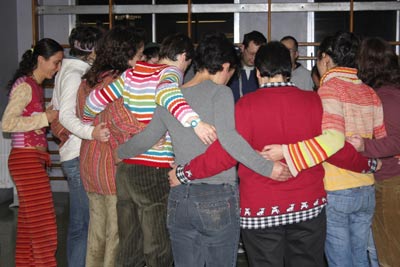I direct two choirs as one of my tasks as area director of The Special Gathering, which is a ministry within the mentally challenged community. During one of our choir practices, I asked the choir to vote on which songs they would like to sing when we perform at a local church. We were currently rehearsing about five songs. We will sing at a large Presbyterian church and we will be ministering at their 10:30am worship service. To my amazement, as we went through the list, they didn’t and even with encouragement they wouldn’t raise their hands to tell me their choice.
When Tim spoke out that he liked the second song best, everyone chimed in to agree with him. I was surprised–not at their selection but in their hesitation to raise their hands regarding their personal choice. These are men and woman who are the leaders in our ministry in Melbourne. They are intellectually disabled but they are our deacons. During our prayer time, they are the ones who stand at the front of their peers and pray for the member who request prayer. They are part of our praise team. They lead singing, read the scriptures and greet visitors.
Yet, they were hesitant to give their opinion regarding their choice in a musical selection. Once again they were exhibiting their need to please people who are in authority. They didn’t want to be wrong and not please me. They were refusing to take the risk of offending me.
I can only vaguely imagine the intimidation that my friends have endured that make them too afraid to give me their opinion. I am their friend and they know it. Additionally, these 13 men and women are not timid wallflowers. They are forward looking individuals who laugh and joke and seem to express their opinions with ease. Now, I wonder. How much are they hiding? How much of this self-confidence is another set of learned behaviors exhibited to impress the outside world?
Each day I realize that there is much to learn about unlocking the potential of these men and women of God. Nevertheless, I see all of humanity as I stare into their faces. As much as we may want to deny it, their simplisitic faith and uncomplicated processing doesn’t make them less like people who are “normal.” If any thing, it exposes more of our humanity than we want to confess.
 God make humans to be people who take risks. It is part of what give us dignity. Often, our community has been push into a corner and denied their God-given right to take risks. However, I could not help but put myself into their faces and remember all the times I’ve not wanted to take a risk because of fear.
God make humans to be people who take risks. It is part of what give us dignity. Often, our community has been push into a corner and denied their God-given right to take risks. However, I could not help but put myself into their faces and remember all the times I’ve not wanted to take a risk because of fear.
Over the past three years, I written a daily blog about The Special Gathering ministry. One of the Google searches that is most requested is a definition of the dignity of risk. This is a phrase that is often used within the intellectually disabled community. After 22 years of ministry within this community, I believe that a good definition is: Dignity of risk is the moving away from a safe place, in order to fully experience the self-respect and self-esteen of being a human being.
Taking risks is one quality that moves humans from the animalistic realm of instinct or habit. Therefore, anyone denied the ability to take risks cannot fully understand or experience their true humanity and is consequently denied true dignity.

